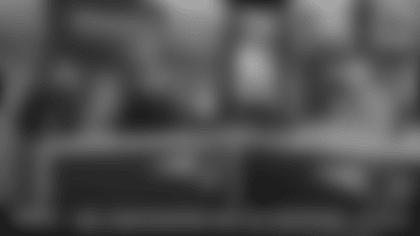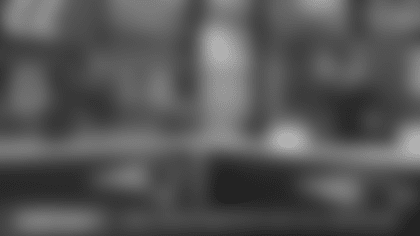BB: Today we're balancing a little bit of working on some things that we need to work on just generically as a team with starting the Pittsburgh preparations. We have quite a few things going on. We'll look back on last week's game, the first six games - actually all 10 games [and] try to evaluate how we're doing some things, where we can improve, maybe what things we want to do more of, things like that. We're in the process of finishing up a couple of transactions here overall with the team, so we'll announce those later on when everything is completed relative to the practice squad, PUP and so forth. We'll give you that a little bit later.
Q: In relation to the PUP, guys are limited in what they can do. Can you walk us through what these guys have been doing throughout the season so far?
BB: They've been working on their own to be ready to practice when they're cleared to practice - running, lifting, changing directions, different strength, agility, and speed drills.
Q: You have practice over the next few days, is this kind of a technique, fundamentals and teaching period here?
BB: Again, there are a lot of things that we're going to be working on. Yeah, some of it is definitely individual techniques. Some of it is group combination things. Some of it is team situational type things that involves everybody or an entire unit that is out there. We cover all those things, absolutely. You have a list of things, you take the priorities - we have to do this, we have to do that, this is less important than something else. You work on things you feel like are more important.
Q: You and Tom Brady have had great success as a quarterback and coach combo with 116 wins together. What does that take? Is it two guys that really think alike? I know it's a whole team, but do you both approach it mentally the same way with the mindset and intensity?
BB: It definitely takes a whole team - I think that's the big thing. Tom and I - I feel like I have a good player-coach relationship with Tom. We have spent, through the years, a decent amount of time together on a regular basis. I think that's important. We talk regularly during the week about what's going to happen, how we're doing it and then we review what did happen and then we move on to the next stage. It's a continuous cycle that we've kind of been in that routine for a lot of years now. I think that's good - to have a good line of communication with your quarterback. He's the one making most of the decisions out there on the offensive side of the ball - either who to throw it to or as it relates to plays and adjustments at the line of scrimmage. So, I think it's important that both philosophically and from a game management standpoint that the coach and quarterback are on the same page - through the offensive coordinator obviously; Bill [O'Brien] is a key part of that too - but the quarterback as well.
Q: In the scouting process with Marcus Cannon, what did you see from him that led you to believe that he would be a good fit in the program as well as the scheme offensively?
BB: I mean program-wise, I think he's exemplary. I think anybody you talk to down there will tell you his work ethic, his intelligence, conditioning. He really does everything that he's asked to do and he's a smart guy. He's had experience at both tackles. I don't think there's any reason why he couldn't play guard, just on the surface. I'm not saying he can, but I don't see any reason to say he couldn't, let's put it that way. He has position versatility, he's a smart guy, he has good size, runs well. High level of competition, he's performed well. [He has] a lot of things going for him.
Q: What did Brandon Deaderick play in college in terms of defensive scheme? Was that a 3-4?
BB: Of course, Alabama played a lot of nickel defense too, so he actually played all the positions. He played end, he played tackle, he played nose, in their four-man line he played outside [and] he played inside. I think over the last couple of years with him - obviously in the 3-4 [Terrence] Cody played on the nose, but there were times when he did play in there. I think you could look at the Alabama tape and you could see him pretty much playing everywhere - left side, right side, inside, outside.
Q: Going back another year to Ron Brace, at Boston College that was more of a four-man line they played.
BB: It was, yes.
Q: What was his role in that?
BB: His role in that defense was to either play on the guard - basically play on the guard one way or the other, either inside shoulder head up or outside shoulder or to drop into coverage.
Q: Drop into coverage?
BB: They dropped him and [B.J.] Raji a lot. They played a lot of blitz zone and those guys were in coverage a decent amount of time. That's a scheme they played.
Q: On Kyle Arrington's league-leading four interceptions, how much is that him taking advantage of opportunity? How much is he creating? What have you seen out of him?
BB: I think some of the things that we talked about with Kyle at the end of the season after the 2010 season, things that he needed to work on and the areas he could improve. One of them - for any defensive back, they can always improve their ball skills. As an offensive player, as a receiver, you get dozens of balls thrown to you in every practice and individual drills and seven-on-seven, team drills, after practice the JUGS machine, and all those kind of things. Defensively, it's a different story; you don't get very many opportunities to handle the ball. Maybe a couple of opportunities in the beginning of practice and individual-type drills - usually that's with a coach throwing to you which is generally not the same as an NFL quarterback. Your opportunities to catch the ball are limited in practice. It's something that you have to do more on your own. [I'm] not saying on your own, but the coach or somebody else has to set up a drill and have balls thrown to you to work on your ball skills, with a JUGS machine or whatever it is. That's one of things that we talked to Kyle about last year: for something for him to work on in the offseason was playing the ball, handling the ball more, his overall ball skills. Obviously he's done that. He came into camp and even though he wasn't able to practice those first couple of days because of the rule and all, but right from the beginning it was evident that he had worked hard on that. His ball skills and judgment on the ball and decision-making on high pointing the ball or reaching for it with two hands, knocking it down with one hand - all those kind of things that are little things, but they're really not little things, that he had worked on and improved on. They showed up from the beginning of training camp.
Q: With a guy like Jerod Mayo who has been on the shelf or really any injured player, how much impact do they have on the week-to-week preparation? Are they in the room with their teammates? In Mayo's case, is he with the linebackers working with them and talking to them?
BB: It depends. Sometimes they are; sometimes they aren't. The first thing for a player who is rehabilitating an injury is to rehabilitate the injury. Not to give you a long-winded answer, but we have a lot of players in our system. The guys who are playing, they need treatment on some of their stuff too. They get it during the break periods - before the meetings, at lunch, maybe after practice. That room fills up pretty quickly with those guys. Sometimes the players who aren't able to participate or who need more rehabilitation, some of that work gets done during the meeting time so that our medical staff can be more hands-on and can do more things with them because they have so many other guys to deal with at other points of time during the day. Again, to answer your question, we try to do what's best for each individual player. Without a healthy player, you have nothing. The most important thing is to get them healthy, to try to schedule what they need with what our opportunities are to work with them and treat them, have them do different rehabilitation exercises and so forth. We try to do that as efficiently as we can. There's no set rule or formula [like] this guy's in a meeting, that guy's not in a meeting, this guy goes to this meeting and doesn't go to that meeting. When they're getting treatment, they get treatment. When they don't get treatment, they participate with the rest of the team and whatever we happen to be doing. That's kind of how we try to handle it. Once the player gets to a point where he's really able to do most everything that his teammates are doing, what we call 'mainstream,' then he should be able to get his other things done at other points in time of the day where he can devote more time to preparation to actually playing. Whether he's actually ready to play or not, then that's another story. We make that determination based on daily practice opportunities and eventually game situations.
Q: In Jerod's case, is he able to -
BB: All of the above. There's times where has, there's times where he hasn't. At the point in time where he is really able to fully participate practicing, which we're certainly getting close to that, then he'll have less rehabilitation, more practice and do his other extra stuff at times when everybody else is doing it. I know you guys think it's like this big secret society going on here, but what's most important to us is to get healthy players on the field. Believe it or not, that's at the absolute top of our list - is to get players healthy and get them on the field. The quicker that happens, the better it is for the player, the better it is for the team, the more work we can get done [and] the more we can improve. To me, it has to start there.
Q: The new rule this year with the review of all the scoring plays, how has that worked out? Are they actually getting all the scoring plays in time to review them? Has it been a good move?
BB: You would have to talk to them. I have no idea.
Q: From your view?
BB: I don't know, I couldn't tell you that. What they've told us is that every scoring play is reviewed. For example, the Dallas play, the touchdown pass to [Jason] Witten. Supposedly what happened was when that play happened, the review official looks at it and if he feels conclusively that it's a touchdown then he tells the referee it was a touchdown and go ahead with the extra point. If he tells them, 'I'm not sure, I think you need to take a look at this' or whatever they say, then the referee goes back and reviews it and he makes the final decision. They don't consult us and obviously we can't challenge that because it's supposedly already being reviewed. Those are the mechanics of it. What actually happens, I don't know because I'm not a part of it. I don't get any more information than you do.
Q: Do you like the fact that you don't have to use a challenge?
BB: Well it's not an option, so I don't really worry about it.
Q: Along the lines of the healthy players getting back on the field, Sebastian Vollmer came back to practice a little bit last week and was limited but he didn't play in the game. Was there a setback there or is he still headed in the right direction?
BB: I think he's doing better. We'll see where he is. That's where he was last week; we'll see where he is this week. Hopefully that will continue to improve. We just have to wait and see. It's been a couple of days since he was out there. Hopefully his condition has improved and he'll be able to do more.
Q: Is that the same with Julian Edelman?
BB: It's the same with everybody. We don't discriminate between one guy and [another]. We put them out there, we see what they can do. Whatever they can do, if they don't have any setbacks, then we move forward. If they do, then we back off and try to wait to get the injury a little further healed and then try it again. Sometimes you don't know the answer, like where I think it is and where it actually is, once the effort level starts to increase, it might be less than what it was last week. I don't know. There might not be any restrictions at all. Maybe all the sudden it's worked itself out and the player is able to fully participate. I don't really know the answer to that question until you start to test it.
Q: You're so locked into what you guys are doing on a day-to-day basis through the season. During the bye week do you step back and look at the league and the standings and trends or anything like that?
BB: Honestly, I haven't. I think at this point when you start looking at a team like Pittsburgh, you're starting to get into a half dozen games. Giants, Jets, the teams that are ahead of us, we have enough of a view of them that you're not just looking at a snapshot - you're looking at a pretty good, they've been ahead, they've been behind. There's enough red area plays, there's enough third-and-long plays, there's enough third-and-short plays, there's enough two-minute plays. Generally speaking, there's enough plays there where you can get a much better handle on what it appears that the makeup of that team is, as opposed to Week 1 or 2 where you only have a couple of plays of regular season. You look at preseason and that may or not be what they're really doing or really want to do. I think at this point in the year, rather than take an overview the league, you just get a good view of your next opponent much more so than in the first two or three weeks. That's what we'll do with Pittsburgh - look at all their games and maybe try to get ahead a little bit on our next opponents but mainly it's Pittsburgh.
Q: Did you hear any of the reports of the Carson Palmer trade?
BB: No I didn't. But the last reports we had in here were pretty inaccurate so with all due respect, I'll wait until it is official.
Q: What report was that? Terry Francona?
BB: Terry Francona, yeah. We had something confirmed that was several hours from being confirmed. Any factual stuff we want to talk about here?
Q: Is that your bye week hoodie?
BB: Might be.
Q: I don't know if we've seen that style before.
BB: You don't want to make it too popular and take over the gray one.




































